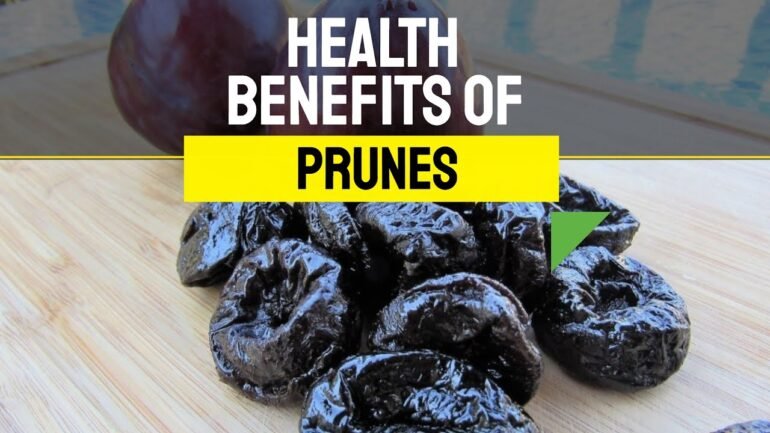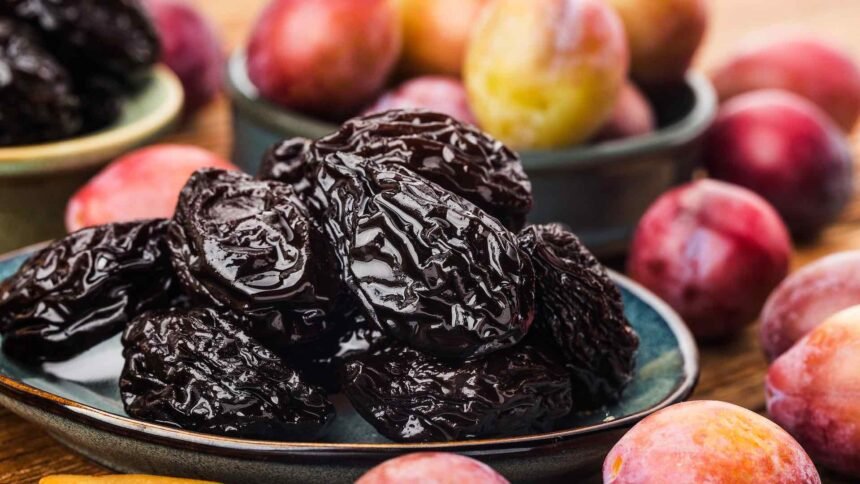Origin and Production
Certain types of plums, typically the European plum (Prunus domestica), are dried to make prunes. They are primarily farmed in South America, France, and the United States (California being the leading producer). They are available all year round since drying prolongs their shelf life and retains their nutrients.
The Nutritiousness of Prunes
A serving of 100g of prunes offers:
- Approximately 240 kcal
- 64g of carbohydrates, primarily from natural sugars
- 2.2g of protein
- 7g of fiber
- Vitamins: Vitamins A, B6, and K
- Minerals: iron, copper, manganese, potassium, and magnesium
The Health Advantages of Prunes


Could promote bone health
Prunes may help you retain strong, healthy bones if you include them in your diet. Prunes may help reverse bone loss as well as prevent it, according to research on animals. Prunes are a beneficial dietary addition for middle-aged adults who may be at risk of osteoporosis because they are an excellent source of minerals that help strengthen bone, such as boron and vitamin K.
Might encourage heart health
Prunes are a great source of fiber, but they are particularly high in soluble pectin, which may help lower cholesterol. But it is not just the fiber that is good for you; prunes’ protective antioxidant qualities and vitamin and mineral content—especially their high potassium content—also seem to help decrease blood pressure.
Could lower the chance of developing type 2 diabetes
Consuming entire fruit, including prunes, is linked to a lower risk of type 2 diabetes. This can be explained by a variety of factors, such as their high fiber content, rich phytochemical levels, and micronutrient contribution. Additionally, although prunes have a sweet flavor, they do not actually raise insulin and blood sugar levels the way other sweet meals do.
Could slow down the aging process
Because of their extraordinarily high quantities of polyphenols—plant substances believed to be twice as abundant in prunes as in other fruits and vegetables—prunes may help slow down the aging process.
Could promote mental well-being
Studies on both humans and animals seem to indicate that diets high in protective substances, such as polyphenols, may help lower anxiety levels, which may then improve cognitive function.
Might offer a consistent energy source
Because of their high fiber content and low glycaemic sugars (fructose and sorbitol), prunes are a useful source of energy without causing a sharp spike in blood sugar levels.
Prunes' Use in Cooking
Because of their versatility, prunes can be used in both savory and sweet recipes:
- eaten by themselves as a snack.
- added to salads, cereals, and smoothies.
- utilized in baking (breads, cakes, and muffins).
- cooked for their inherent sweetness in stews, chutneys, or sauces.
- added to trail mixes or energy bars.
Conclusion
Prunes are a nutrient-dense food that promotes heart health, bone strength, digestion, and general well-being, making them more than just a natural cure for constipation. Prunes are a tasty and nutritious complement to any diet, whether they are consumed as a fast snack or included into meals.


